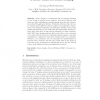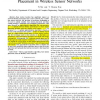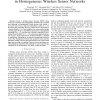1074 search results - page 202 / 215 » Energy Conserving Routing in Wireless Ad-hoc Networks |
104
click to vote
TWC
2008
14 years 9 months ago
2008
This paper considers a multi-hop network in which relay nodes cooperate to minimize the total energy consumed in transmitting a (unicast) packet from a source to a destination. We...
69
Voted
EWSN
2009
Springer
15 years 10 months ago
2009
Springer
Sensor sleeping is a widely-used and cost-effective technique to save energy in wireless sensor networks. Protocols at different stack levels can, either individually or simultaneo...
CN
2008
14 years 9 months ago
2008
Wireless sensor networks enhance our ability to monitor the physical world. Many recent researches on wireless sensor networks have focused on aspects such as routing, node cooper...
SECON
2007
IEEE
15 years 4 months ago
2007
IEEE
Base station location has significant impact on network lifetime performance for a sensor network. For a multihop sensor network, this problem is particular challenging as we need ...
GLOBECOM
2007
IEEE
15 years 4 months ago
2007
IEEE
— Given a wireless sensor network (WSN) whose sensors are randomly and independently distributed in a bounded area following a homogeneous Poisson process with density ρ and eac...



